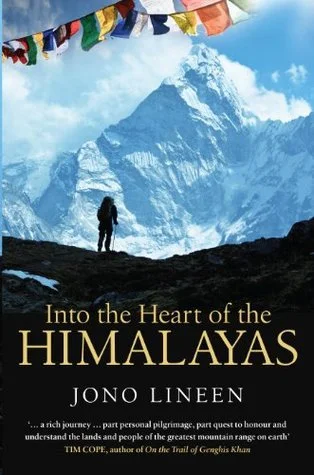
Dipdyuti Chowdhury, IOCL
dipdyuti@indianoil.in

There is something compelling about the nature that attracts humans to it. Whether this magnetism comes from nature’s beauty, it’s restorative properties, or the pure and fresh air from trees, something within nature makes us healthier when we are in it. Just a walk in the woods or a stroll by the beach on a sunny morning can awaken the innermost feelings of happiness and peace. On this environment day, ‘Into the heart of the Himalayas’ reminds us of the beautiful bond that exists between human spirit and nature.
A brief on Jono Lineen: Jono Lineen was born in Belfast, Northern Ireland in the later part of the sixties. His family, later migrated to Canada when he was a young boy.
One day, his brother Gareth (A rowing enthusiast) dies in a boat accident. The death was particularly harrowing because it was not by drowning. He managed to keep himself afloat by holding on to the overtured skiff.
Immersed in the waters of a lake at a temperature of 4 degree Celsius, he struggled to stay afloat and managed to stay awake for hours before hypothermia overcame his physical struggle and pulled him into a state of oblivion. He was an Olympic level athlete and could put up a long and arduous fight for survival, but all went in vain. He was in his twenties when his death occurred.
A brief on the book: the book starts with, how Gareth’s body was brought back, and the family ritualistically and naturally grieved over his departure. Some griefs are too painful and intense to be understood or even analyzed. Jono suffered a dull pain and a listlessness about him. After two years of aimless wandering, he decided to go on a solo trek of the Himalayas – a long route that started from the Indus River, in the west to culminate in the western border of Nepal. The total route was over 2700 KMs.
The book basically describes his experiences with different cultures, religions, and geographical environments. As he said, “Most importantly the walk would let me be one-on-one with the people who make those mountains so magical”.
Externally it’s a travelogue. But the contemplative thoughts that dawn on him during his journey – transform this into a book on self-realization and spirituality. Walking is one of the most fundamental forms of meditation. As Rousseau said, “Never did I think so much, exist so vividly, and experience so much myself – if I may use that expression – as in journeys I have taken alone and on foot.”
I have been reading and reading this book for the last two years, because it gives me peace and solace in the most unexpected places.
Why I recommend this book: Modern life and our circumstances has made us success freaks. We allow standards of success set by others to pollute our minds. We create a meaningless dissonance of being a failure, within ourselves. We read self-help books and go to management Gurus to learn the art of how quickly to achieve success. Most of our physical diseases are created in a vicious world of self-incriminations and a feeling that we have not achieved what we were destined to achieve. This so-called achievement-focus has destroyed our lives to such an extent that many of us suffer from psychological problems.
The real power in a person is within himself. A state of mental equilibrium is the state of greatest peace or Nirvana. However, to achieve that level of equanimity and happiness, one requires a period of contemplation which brings maturity to our thought process. A period of slow contemplation while moving through various cultures result in a far deeper understanding of life and its importance.
At the end, inner peace and happiness is the biggest achievement and this book helps in setting a route map for that.
This is particularly relevant for us because we do not have any contemplative time for ourselves. Our workdays are packed, and our holidays are also packed with planning, organizing, and doing. This lack of self-contemplation is one fundamental lacunae of our lives. Every person should have some time completely for himself / herself. It could be a little time-space in a day, or week or month, but self-contemplation nurture creativity and solve many mental blocks, that act as irritants and create issues in our overall productivity and happiness.
Jono Lineen, became contemplative due to a calamity that devasted him, but we all can be contemplative without waiting for a calamity to strike us.
Posted in Book Reviews | No Comments »
Recent Articles
- Hit Refresh: The Quest to Rediscover Microsoft’s Soul and Imagine a Better Future for Everyone by Satya Nadella
- ‘Range – How Generalists Triumph in a Specialized World’ by David Epstein
- Handbook of Sustainable Development
- Into the heart of Himalayas
- The Millennials: Exploring the World of the Largest Living Generation
- Systemic Coaching & Constellations
- Beyond Talent
- Practicing the Power of NOW
- Elephants and Cheetahs: The Beauty of Operations
